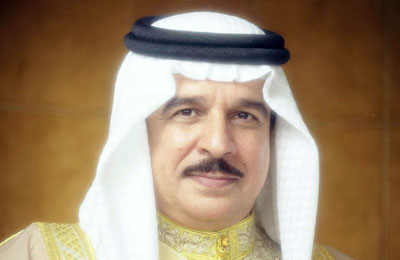
His Majesty King Hamad
Zero tolerance on terror, vows Bahrain King
Manama, May 9, 2013
Terrorists seeking to impose their will on others through violence will not be tolerated, Bahrain’s His Majesty King Hamad has pledged in an interview.
Speaking to Harvard University's Nieman Reports, he drew parallels between the detonation of explosives in Bahrain with the Boston Marathon bombings in the US last month, the Gulf Daily News reported.
However, he said he believed people involved in such terrorist acts were "losing steam".
"In Bahrain and in Boston, terrorists used pressure cookers to assemble their homemade bombs, which killed innocent people and injured hundreds," he said. "I believe these undemocratic saboteurs are losing steam.
"We all want change for the best of Bahrain. I myself want change, maybe more than anyone."
Nieman Reports is a publication produced by the Nieman Foundation for Journalism and the King used the interview to describe dialogue as the only way to solve Bahrain's problems.
"It is fine to disagree with the government and to want to change the law," he said.
"There is only one way. It is not violence; it is dialogue. It is not intimidation; it is accommodation. Some small groups want to impose their will on everyone else by using violence. They have the advantage of being able to plan their sabotage anywhere.
"But the whole world has condemned violence in Bahrain as it would do in any other country. Terrorism has no religion and has the same ugly face internationally,” he added.
He also denied allegations that people had been jailed in Bahrain for simply expressing an opinion.
"No-one in Bahrain is prosecuted for their opinions," he said.
"That is everyone's right. But people who are filmed while inciting others to take up arms, to confront the police, and to demonstrate in sensitive areas without a permit should not say that they are pursued for their opinions. This cannot be tolerated in any country. They are breaking the law."
He added that while people were free to demand change, they were not entitled to infringe on the rights of others.
"All of us have the rights of citizens, and citizens have the right to complain and to demand change," he said. "But no ne has the right to deny the rights of others."
The King also denied allegations by activists and some rights groups that there had been no real reform in Bahrain following a probe by the Bahrain Independent Commission of Inquiry (BICI).
"There had been reforms in various sectors, like police and the judicial system," he said.
"This is an ongoing process. Also, during the first dialogue that took place after the (BICI) report was issued, 20 constitutional articles were amended based on the consensus of the different parties so that the new Cabinet is required to win the vote of confidence of the elected council (parliament) based on their programme.
"These reforms ensure that the formation of the Cabinet and the plan reflects the will of the people. We are the first country in the Gulf that allowed this major shift of power to the people, the King added.
Bahrain's relations with the West have been strained by foreign criticism and there have been calls to boot out US Ambassador Thomas Krajeski over concerns that he is too close to the Bahraini opposition, although he denies meddling.
However, the King dismissed claims that US-Bahrain relations were faltering.
"The relationship is so strong that any attempt to destroy that will fail," he said. "It is normal between friends and brothers to have different opinions from time to time, but then both parties should find constructive solutions."
In fact, he said the US had its own human rights concerns and needed to go through its own process of reform.
"For example, in how they engage with Muslims and other minorities in their society," he said.
"If you look at the human rights reports about the situation in the US, it shows that they are also having ongoing reforms. Bahrain is like the US and other countries; this is in an ongoing process."
However, the King said he thought the "Arab Spring" had left people in countries affected in a worse condition than they were before.
"People had many and different hopes of what the Arab Spring would bring for them and are now very disappointed," he said.
Heartbroken
"I think many ordinary people are heartbroken to find their lives worsened as a result of the destruction of institutions. It is easy to destroy, but it is difficult to build."
During the interview, the King outlined plans to develop Bahrain's own media sector with a new council to come up with a policy.
"I believe that the media plays an important role in the development of a country," he said.
"To me, a free and ethical media is very crucial, and we therefore are going to establish a council in Bahrain with members from all stakeholders of society, like NGOs, members of parliament, women's organisations and religious groups.
"This council will set the policy for the media. This media governance structure was created in consultation with the French government and based on global best practices."
Meanwhile, he also stated that plans to transform the GCC into a Gulf Union were at an advanced stage. "The Gulf Union is steadily moving forward," he said.
"Consultations between the GCC countries are in advanced stages. The Gulf Union is an immediate need for our region and is fundamental to the fulfilment of our people's aspirations." – TradeArabia News Service







